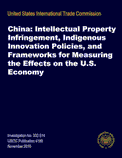
Summary
Infringement of intellectual property rights (IPR) in China reduces market opportunities and undermines the profitability of U.S. firms when sales of their products and technologies are undercut by competition from illegal, lower-cost imitations, according to the U.S. International Trade Commission (USITC) in its latest report.
There is also growing concern that the Chinese government?s indigenous innovation policies, which promote the development, commercialization, and purchase of Chinese products and technologies, may create new barriers to U.S. foreign direct investment and exports to China.
The report is the first of two on IPR infringement and indigenous innovation policies in China and their effects on the U.S. economy that the USITC is preparing for the U.S. Senate Committee on Finance. The USITC describes the principal types of reported IPR infringement in China and Chinese indigenous innovation policies, and it outlines an analytical framework for determining the effects of IPR infringement and indigenous innovation policies on the U.S. economy and jobs, which it will use in its second report. The USITC found:
- Enforcement of IPR laws remains a serious problem in China. Significant structural and institutional impediments undermine effective enforcement, including the protection of IPR infringing industries by local Chinese officials, a lack of coordination among government agencies, insufficient enforcement resources and training, and non-deterrent civil and criminal penalties. However, there are some signs of improvement in IPR enforcement, particularly in courts in major cities in China.
- Ineffective IPR enforcement contributes to the widespread infringement of U.S. firms' copyrights, trademarks, patents, and trade secrets in China. Intellectual property is often the most valuable asset that a company holds, but many companies, particularly small ones, lack the resources and expertise necessary to protect their property in China.
- Intellectual property (IP) creation and technological innovation drive U.S. economic growth through the creation of new and improved products and processes, greater efficiencies, and enhanced returns on investments. IP-sensitive industries reportedly pay their employees more and have higher output and sales per employee than those of non-IP sensitive industries.
- China is implementing indigenous innovation policies that may reduce business opportunities for U.S. firms in China's fast-growing economy. This "web of policies" - often embedded in government procurement, technical standards, anti-monopoly, and tax regulations - may make it difficult for foreign companies to compete on a level playing field in China.
The USITC’s report is now available at: http://www.usitc.gov/publications/332/pub4199.pdf
Also available on CD-ROM and in print; call 202.205.2000 for more information.


















